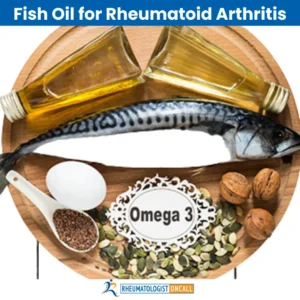SHARE
Rheumatoid arthritis (RA) is an inflammatory autoimmune disease affecting over 1.3 million adults in the United States. It causes painful swelling and eventual joint damage. While medications are the primary treatment, certain supplements may also help reduce Rheumatoid arthritis (RA) symptoms.
Supplements cannot cure Rheumatoid arthritis (RA), but when combined with prescription medications, they may lower inflammation, decrease pain, and improve quality of life. This article will explore the top scientifically-studied supplements for Rheumatoid arthritis (RA) management.
Why Supplements for Rheumatoid Arthritis?
In Rheumatoid arthritis (RA), the immune system mistakenly attacks the lining of the joints, leading to inflammation and thickening of the synovial membrane. This erosion of cartilage and bone causes stiff, painful joints.
Powerful disease-modifying antirheumatic drugs (DMARDs) like methotrexate are the first-line medications used to control overactive immune responses. However, these treatments often have side effects.
Certain supplements may complement prescriptions by reducing inflammatory cytokines and oxidative stress and reducing the need for high doses of medications.
Studies show some supplements decrease morning stiffness tender joints, and use non-steroidal anti-inflammatories (NSAIDs). Others improve gut health and immune function. Before starting any supplement, all patients should discuss their options with a physician who can advise them about their drug-to-drug interactions and ensure the supplements are safe.
What are the best supplements and vitamins for Rheumatoid arthritis (RA)?
A billion-dollar industry of natural supplements and vitamins is sold for their potential benefits to optimize people’s health. Regarding Rheumatoid arthritis (RA), just a few have scientific evidence to support their use.
Here are eight of the best vitamins and supplements for Rheumatoid arthritis (RA):
Vitamin D for Rheumatoid Arthritis
This “sunshine vitamin” is key in immune modulation and bone health. Low levels are common in Rheumatoid arthritis (RA) patients, especially in northern climates.
Studies link vitamin D deficiency to a higher risk of developing autoimmune conditions like Rheumatoid arthritis (RA). Supplementing may reduce inflammation and decrease the risk of osteoporosis, which is high in patients with Rheumatoid arthritis.
Talk to your doctor to check your Vitamin D level yearly and supplement accordingly.
Fish Oil for Rheumatoid Arthritis

Fish oil provides anti-inflammatory omega-3 fatty acids called EPA and DHA. These can inhibit COX-2 enzymes and pro-inflammatory cytokines like tumor necrosis factor-alpha (TNF-α).
In a 2015 study, Rheumatoid arthritis (RA) patients taking high-dose fish oil with triple DMARD therapy had increased remission rates and lower disease activity versus the non-fish oil group. Other studies found improved duration of morning stiffness and reduced joint pain with fish oil.
The important omega-3s in fish oil may allow lowering doses of NSAIDs. Always opt for high-quality purified fish oil supplements to avoid heavy metal and pollutant contamination.
Turmeric for Rheumatoid Arthritis
The golden spice contains the powerful compound curcumin. It demonstrates antioxidant, anti-inflammatory, and immune-regulating properties in studies.
Curcumin may work by lowering inflammatory cytokines like interleukin-6 (IL-6). Pair turmeric with black pepper for enhanced absorption.
People with Rheumatoid Arthritis (RA)who take turmeric for at least 90 days will report decreased pain, inflammation markers, and disease activity and decrease the need for other nonsteroidal anti-inflammatory medications without any other side effects.
Probiotics for Rheumatoid Arthritis
These beneficial bacteria promote gut and immune health. Imbalances in gut microbiota might play a role in Rheumatoid arthritis (RA) development. Specific strains like Lactobacillus casei reduce inflammatory cytokines and RA symptoms when supplemented.
Focus on multi-strain probiotic products with at least 20 billion colony-forming units.
You may also replace supplements with fermented foods like sauerkraut, kimchi, kefir, and yogurt for added prebiotic and probiotic effects.
Quercetin for Rheumatoid Arthritis
This antioxidant plant pigment in fruits, vegetables, and tea displays impressive anti-inflammatory and immune-regulating activity. As a supplement, it may suppress the production of inflammatory compounds involved in Rheumatoid arthritis (RA).
Some small studies show quercetin lowers morning stiffness, the number of tender joints, and disease activity in Rheumatoid arthritis (RA) patients. More research is underway on optimal dosing.
Coenzyme Q10 for Rheumatoid Arthritis
CoQ10 is an antioxidant that supports cellular energy production. Some studies indicate it may reduce inflammation and Rheumatoid arthritis (RA) disease activity when taken at 100 mg daily doses.
Pomegranate Extract for Rheumatoid Arthritis
Pomegranates contain antioxidant and anti-inflammatory compounds called punicalagins. Some small studies show pomegranate extract inhibits inflammatory pathways and reduces damage from Rheumatoid arthritis (RA).
Garlic Extract for Rheumatoid Arthritis
This odorless aged garlic extract supplement exhibits immune-modulating properties. Research reveals it may suppress the activation of Rheumatoid arthritis (RA) inflammatory cytokines and immune cell proliferation.
Partner with Your Rheumatologist on Supplements for RA
Always consult your rheumatologist before trying supplements. They can advise which options are suitable based on your health status and prescription medications. Most Rheumatoid arthritis (RA) patients take a DMARD like methotrexate as the treatment foundation.
Supplements may provide added benefits but won’t replace core medications. Tracking your symptoms and disease activity helps determine effectiveness. Rotating single supplements in 3-month intervals lets you assess benefits individually.
Start with foundational options like fish oil and vitamin D. Then add others individually, like turmeric, probiotics, quercetin, etc. Take at least 3-6 months to evaluate the impact fully. Record effects in a journal.
Diet, Exercise, and Lifestyle Are Critical
An anti-inflammatory diet, physical activity, stress management, and restorative sleep also help control rheumatoid arthritis. Be sure to:
- Follow a gut-healthy Mediterranean-style diet emphasizing fruits, veggies, fish, nuts, seeds, and olive oil
- Engage in gentle, regular exercise like walking, water aerobics, tai chi, yoga, cycling
- Practice relaxation techniques like meditation, deep breathing, guided imagery
- Get at least 7-9 hours of quality sleep per night
- Quit smoking
- Minimize alcohol intake
While research continues on vitamins and supplements for Rheumatoid Arthritis, current options provide a safe way to potentially reduce symptoms naturally alongside standard medical treatments. Finding the right combination of medications, lifestyle measures, and supplements offers the best chance of success in managing Rheumatoid Arthritis.
If you seek a comprehensive approach incorporating nutrition, exercise, mindfulness, and cutting-edge therapies, consider calling us at Rheumatologist Oncall. We specialize in treating patients with Rheumatoid Arthritis, and we also offer prompt, affordable, high-quality medical consultations from the comfort of your home.















One Response
Dr. Ashish K Badika is an Arthritis Doctor in Indore with have 3 years of advanced training in Rheumatology and Clinical Immunology including 2 years Post Doctoral.